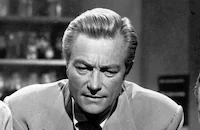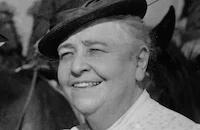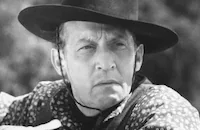Producer Samuel Z. Arkoff, who died September 16 at the age of 83, made a dent in film history by co-founding and running the legendary American International Pictures (AIP), a key player in the drive-in and exploitation markets during the 50s, 60s and 70s. Arkoff was born in Iowa on June 12, 1918, served as a military crypographer during World War Two and ended up as an entertainment lawyer. Life changed in 1954 when he and former theatre owner James H. Nicholson founded American Releasing Corporation, a name changed two years later to American International. Their first film was The Fast and the Furious (1954), a road race melodrama starring John Ireland as a fugitive from justice, which cost $75,000 and earned double that amount giving the company a healthy start. The film also kicked off the career of screenwriter Roger Corman who would later become a key B-movie producer and director himself, and provided the title for one of 2001's biggest hits of the summer.
AIP tapped into a previously nonexistant teenage market, the same one fed by rock 'n' roll but not well served by the large Hollywood studios. Arkoff and Nicholson split duties with the colorful, cigar-chomping Arkoff doing the business end and Nicholson handling the creative end (including those unforgettable titles). AIP films included such titles as Attack of the Crab Monsters(1957), I Was a Teenage Werewolf (1957), Beach Blanket Bingo (1965), Black Caesar (1973) and close to 200 others. AIP also imported European and Asian films of commercial potential such as Mario Bava's moody masterworks (Black Sunday, 1960) but also pure schlock like Jess Franco's Attack of the Robots (1966) or the giant monster Gamera series from Japan. These films were usually money makers because of their low costs and built-in market and remain entertaining to this day. AIP also gave a start to then-struggling actors and directors like Robert De Niro (Bloody Mama 1970), Peter Fonda (The Trip 1967), Martin Scorsese (Boxcar Bertha 1972), Jack Nicholson (The Terror (1963), Brian De Palma (Sisters 1973) and Francis Ford Coppola (Dementia 13 1963). By the 1970s the major studios had moved into the market and AIP itself was making more expensive films like The Island of Dr. Moreau (1977) and The Amityville Horror (1979). That combination put AIP in financial trouble; they were sold to Filmways in 1979. Arkoff founded his own Arkoff International Pictures but it made few films; Larry Cohen's Q (1982) was one of the few notable titles.
By Lang Thompson
PAULINE KAEL 1919-2001
Pauline Kael, who died September 3rd at the age of 82, was one of the handful of film critics who made a noticable impact on the way we view movies. Her mix of personal feelings with more abstract aesthetics inspired numerous other critics (sometimes called "Paulettes") and in a few cases even made big hits of movies like Bonnie and Clyde (1967). She claimed to never see a movie more than once or to change her mind about it later. Several collections of her work are available, most with mildly risque titles like I Lost It at the Movies, Kiss Kiss Bang Bang and Going Steady.
Kael was born June 19, 1919 in Petaluma, California but moved with her family to San Francisco during her teens. There she majored in philosophy at University of California at Berkeley though she didn't graduate (the school later gave her an honorary degree). That's when she started to develop a serious interest in movies. In addition to the usual writer's assortment of jobs (seamstress, cook, retail clerk) she started writing about film in 1953; her first review was of Charlie Chaplin's Limelight which she disliked. She wrote for several small publications and did a radio show on the groundbreaking network KPFA before finally landing a job at the high-profile McCall's only to be fired shortly after she panned The Sound of Music (1965) (which she called The Sound of Money). During this period she was also managing and programming Berkeley Cinema Guild Theatres (one of the country's earliest repertoire cinemas despite being basically small rooms above a laundry), and was briefly married to avant-garde filmmaker James Broughton.
The turning point came in 1965 when I Lost It at the Movies not only attracted major critical attention but became a strong seller in book stores. Two years later legendary editor William Shawn hired Kael as film critic for The New Yorker, completing her jump into the limelight. Kael never shied away from controversy as two other events proved. In the early Sixties she engaged in an infamous and surprisingly bitter debate with critic Andrew Sarris among others about the merits of auteurism, the French-born philosophy that believes the director is the chief creative person behind any film. Kael's anti-intellectual streak came forward but since auteurism wasn't meant to be a genuinely rigorous theory (such attempts came later in the 70s) this was a sort of Brer Rabbit vs. tar baby fight that Kael could never win. The other notorious controversy occured in 1971 with her essay "Raising Kane" which was intended to show that screenwriter Herman Mankiewicz deserved as much if not more credit for Citizen Kane (1941) than Orson Welles. While Mankiewicz's contribution had clearly been underappreciated, most of Kael's conclusions and even some of her factual basis have been disproven though she never bothered to revise the essay.
In 1979, Kael made a detour to Hollywood by the urging of Warren Beatty. She was meant to be an "executive consultant" at Paramount but actually making movies is quite a different matter than writing about them so Kael lasted only five months. She went back to The New Yorker, eventually retiring in 1991 partly as a result of Parkinson's Syndrome. She still kept up with movies though, loving such smaller films as Vanya on 42nd Street and actors like Jim Carrey (who "has practically kept movies alive the past few years" she said in 1998).
By Lang Thompson
Troy Donahue 1936-2001
Troy Donahue died September 2nd at the age of 65. He was a fixture in movies during the 1950s, playing an assortment of heartthrobs and borderline tough guys. Donahue was actually Merle Johnson Jr, born in New York City on Jan 27, 1936. He went to Columbia University and started acting in small theatrical roles which eventually
led to film appearances, the earliest ones uncredited. His first was Man Afraid (1957) but Donahue also made brief TV appearances at the time on shows like Wagon Train. He signed with Warner Brothers in 1959 and immediately jumped to stardom in films like A Summer Place and Imitation of Life (both 1959). He was busy in a variety of films during this periods - notably Parrish (1961) and Rome Adventure (1962) - but also starred in the TV series Surfside 6 (1960) and Hawaiian Eye (1962 and predating Hawaii Five-O by several years). Donahue's career declined as the Sixties became more turbulent but he still made notable appearances in The Godfather Part II (1974), playing a character with Donahue's own real name, and Monte Hellman's Cockfighter (1974). Most of Donahue's later films were direct-to-video efforts like Nudity Required and Omega Cop but trash aesthete John Waters, a huge fan, used him for Cry-Baby (1990).
By Lang Thompson
TCM REMEMBERS CARROLL O'CONNOR 1924-2001
Carroll O'Connor - who died June 21st at the age of 76 - will be best remembered for portraying Archie Bunker on TV's All in the Family but his career actually was much more extensive. Born in New York on August 2nd, 1924, O'Connor served in the merchant marine during World War II before attending the University of Montana where he worked on the school newspaper. Before graduating, he followed his brother to another college in Ireland (he would later get a Masters in speech from Montana). It was in Ireland that O'Connor started acting in several local productions. He returned to the U.S. for his Broadway debut in 1958 and shortly after started to appear on numerous TV shows like The Untouchables and Naked City. His first film was Parrish (1961) though he eventually acted in over a dozen films during the Sixties including Cleopatra (1963), Marlowe (1969), Hawaii (1966) and Point Blank (1967). O'Connor even auditioned for the part of the Skipper in the TV series, Gilligan's Island, but it was his role as Archie Bunker in a 1971 sitcom that made him a star. All in the Family was an American version of the British sitcom Till Death Do Us Part that met some initial resistance (ABC rejected the first two pilots) but quickly captivated American audiences and became the country's top-rated TV show. Archie became such an icon that his chair is now preserved in the Smithsonian. The series lasted until 1979 and brought O'Connor four Emmys, even leading to a four-year spinoff Archie Bunker's Place starring O'Connor. (It also produced one of TV's oddest spinoffs in1994's 704 Hauser about a multi-racial family living in Archie Bunker's old house. It had no cast members from the earlier series and only lasted six episodes.) In 1988, O'Connor took the role of a Southern sheriff in a TV series based on the movie In the Heat of the Night and found himself in another hit, this one lasting until 1995. He also occasionally played Helen Hunt's father on Mad About You. By all accounts, O'Connor was nothing like Archie Bunker; in fact, O'Connor was an active anti-drug crusader, partly the result of his son's drug-related suicide.
By Lang Thompson
TCM REMEMBERS JACK LEMMON 1925-2001
Whether playing a cross-dressing jazz bassist or a bickering roommate, Lemmon has kept his fans in stitches for fifty years. But beneath that comedian's facade, the actor had a very serious side, which occasionally surfaced in such films as Days of Wine and Roses (1962) or Costa-Gavras' political thriller Missing (1982). Lemmon was truly a one-of-a-kind actor and his track record for acclaimed performances is truly remarkable: 8 Oscar nominations (he won Best Supporting Actor for Mister Roberts (1955) and Best Actor for Save the Tiger (1973), a Life Achievement Award from the American Film Institute, 8 British Academy Award nominations, 4 Emmy Award nominations, numerous Golden Globe nominations, a two-time Best Actor winner at the Cannes Film Festival, the list goes on and on.
Lemmon entered the world in a completely novel fashion; he was born prematurely in an elevator in Boston in 1925. The son of a doughnut manufacturer, Lemmon later attended Harvard University but was bitten by the acting bug and left the prestigious college for Broadway. Between theatrical gigs, he played piano accompaniment to silent films shown at the Knickerbocker Music Hall in New York. Later, Lemmon claimed that he learned more about comic technique by watching these Chaplin, Keaton and Harold Lloyd two-reelers than acting school could have ever taught him.
From Broadway and early TV appearances to Hollywood, Lemmon moved West to make his screen debut in It Should Happen to You (1954), opposite Judy Holliday in a variation of her 'dumb blonde' persona that had won her an Oscar for Born Yesterday (1952). In It Should Happen to You, Holliday plays a struggling actress who soon wins fast fame as the product of promotion. Lemmon plays her levelheaded boyfriend but finds himself on the sidelines when the suave and sophisticated Peter Lawford appears on the scene. It Should Happen to You, directed by George Cukor, was a popular success and Lemmon and Holliday were quickly teamed again in Phffft! (1954), another lightweight romantic comedy. A year later, Lemmon hit the major leagues when he supported Hollywood heavyweights Henry Fonda, James Cagney and William Powell in Mister Roberts (1955). As Ensign Pulver, a deckhand who avoids work whenever possible, Lemmon won a Best Supporting Actor Oscar¿.
Onscreen, Lemmon's characters often found that they were the wrong men for their jobs. In Cowboy (1958), Lemmon plays a city slicker venturing out on the wild frontier. His romantic visions of the West are soon changed by the hard-living, hard-drinking reality. Cowboy is based on the autobiography of Frank Harris, and, like the author, Lemmon found himself adapting to the rough and tumble lifestyle on the trail.
Lemmon brought a new comic persona to Hollywood films. He combined elements of screwball and slapstick comedy with his own self-deprecating humor to create satiric portraits of the contemporary American male. The sometimes cynical comic sense of director Billy Wilder provided Lemmon with the perfect complement. Together they made seven films, but it was their first, Some Like It Hot (1959), that captured the sheer comic genius of their collaborations together.
From sexual antics to social critique, Lemmon and Wilder sharpened their comic knives on the hypocrisies they saw in American culture. The Apartment (1960) focused on a working stiff who lends his home to his supervisors for their extramarital affairs. Problems arise when Lemmon falls for his boss's paramour - it gets even more complicated when she tries to kill herself in his pad! Though The Apartment was a comic success, with each passing year the film's serious side seems even more dark and derisive. Illicit love and the corruption of big business might not seem to be the stuff of hit comedies, but Wilder and Lemmon found humor in the most unlikeliest of places. Director and comic star went on to make five more films: Irma la Douce (1963), The Fortune Cookie (1966), Avanti! (1972), The Front Page (1974) and Buddy Buddy (1981).
Billy Wilder and Lemmon's lifelong comic foil Walter Matthau (nine collaborations with Lemmon in 32 years, including their most popular film, The Odd Couple, 1968) brought some of the comedian's finest funny moments to the screen. But there was a serious side too. Lemmon waived his salary to act in Save the Tiger (1973), the 'great American tragedy' of a businessman at the end of his rope. Lemmon won his second Academy Award for the film. In Missing (1982), directed by the uncompromising Costa-Gavras, Lemmon played a patriotic father searching for his kidnapped son in Latin America. The closer he gets to his goal, the clearer it becomes that a government conspiracy is behind his son's disappearance. Missing was inspired by a true story - the production was condemned by the Reagan administration and awarded the Golden Palm at the Cannes film festival.
Very few actors today can match Lemmon's range on the screen. He has acted in everything from lightweight sex farces (How to Murder Your Wife, 1965) to musicals (My Sister Eileen, 1955) to social dramas (Days of Wine and Roses, 1962) to political thrillers (The China Syndrome, 1979). Turner Classic Movies cherishes the memory of this remarkable talent.
By Cino Niles & Jeff Stafford
























